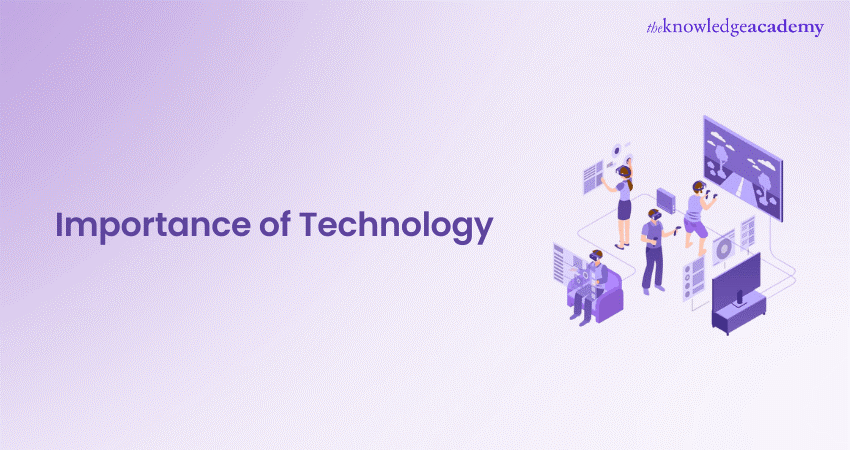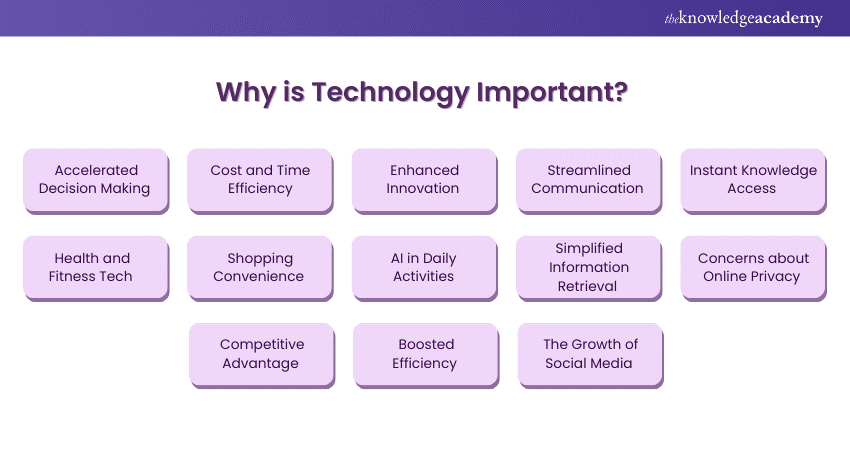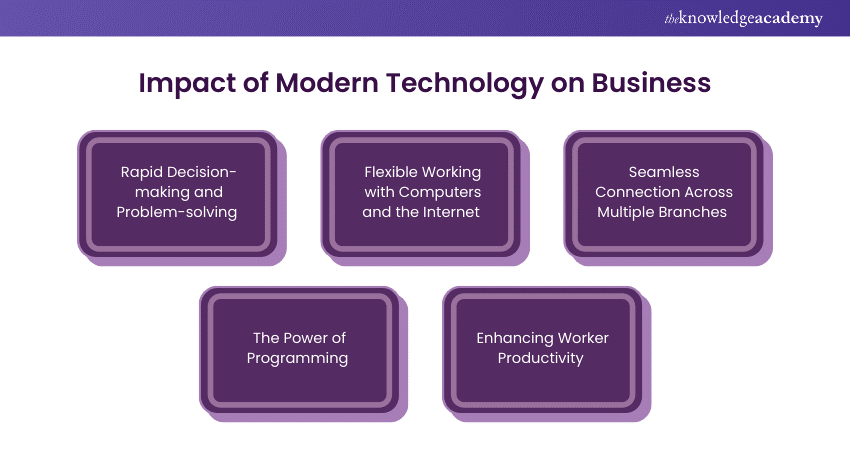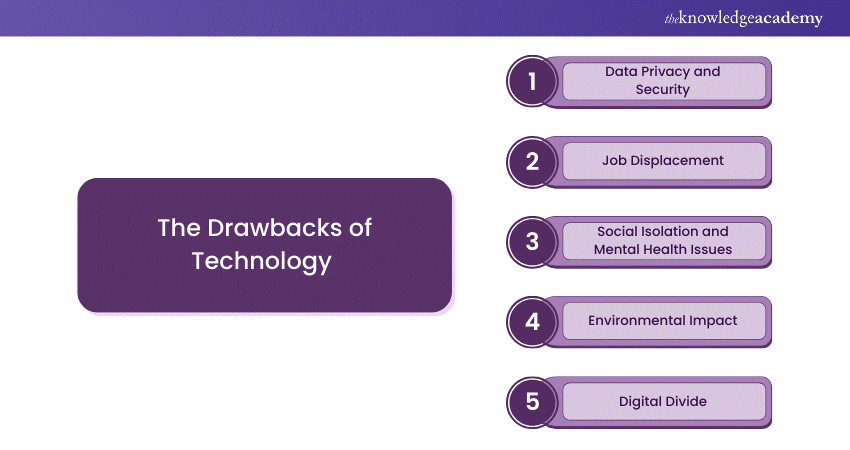We may not have the course you’re looking for. If you enquire or give us a call on 01344203999 and speak to our training experts, we may still be able to help with your training requirements.
Training Outcomes Within Your Budget!
We ensure quality, budget-alignment, and timely delivery by our expert instructors.

Imagine a world without smartphones, the internet, or advanced medical equipment—it's almost impossible, isn't it? The Importance of Technology in our lives today is undeniable, driving every aspect of our daily routines and future aspirations. It bridges gaps, simplifies tasks, and opens a multitude of possibilities previously thought unattainable.
From streamlining business operations and fostering global communication to advancing healthcare and education, technology's impact is profound and far-reaching. Let's delve into the Importance of Technology, exploring how it transforms industries, empowers individuals, and shapes the future of our world.
Table of Contents
1) What is Technology?
2) Why is Technology Important?
3) Impact of Modern Technology on Business
4) Types of Technological Innovations and Their Applications
5) The Drawbacks of Technology
6) Conclusion
What is Technology?
Technology involves the application of specialised knowledge, techniques, and technical processes to achieve specific goals. These goals often include increasing production capacity, advancing scientific research, and enhancing overall efficiency. In essence, technology marks the transition from manual methods to automated processes, aiming to improve efficiency, promote well-being, reduce effort, and simplify various tasks.
In a broader sense, technology signifies the evolution from traditional, labor-intensive approaches to modern, mechanised solutions. This evolution is driven by the need to optimise performance, increase productivity, and improve the quality of life. By leveraging technological advancements, we can achieve greater precision, speed, and effectiveness in numerous fields, from industrial production to scientific exploration. Ultimately, technology serves as a powerful tool for progress, enabling us to accomplish tasks more efficiently and with less physical strain, thereby fostering innovation and enhancing our everyday lives.
Why is Technology Important?
Here are the Importance of Technology:

1) Accelerated Decision Making
Technology enables accelerated decision-making by providing real-time data, advanced analytics, and predictive insights. With powerful software and algorithms, businesses can analyse vast amounts of data quickly, identifying trends and patterns that inform strategic choices.
This speed allows for more responsive and informed decisions, reducing the time between data collection and action. In personal life, technology assists individuals in making quicker decisions through access to information and tools that evaluate options efficiently. Overall, technology transforms decision-making processes, making them faster, more accurate, and more reliable.
2) Cost and Time Efficiency
Technology significantly enhances cost and time efficiency across various sectors. Automated processes replace manual tasks, reducing labor costs and minimising errors. In manufacturing, technology streamlines production lines, cutting down on time and resource wastage.
In offices, software solutions automate routine tasks, freeing up employees to focus on more strategic activities. Technology also facilitates remote work, reducing commuting time and expenses. Overall, the integration of technology leads to more efficient operations, enabling businesses and individuals to achieve more in less time and at a lower cost.
3) Enhanced Innovation
Technology drives enhanced innovation by providing tools and platforms for creativity and experimentation. Advanced software, Artificial Intelligence, and Machine Learning enable the development of new products, services, and processes. In research, technology facilitates groundbreaking discoveries and accelerates the pace of innovation.
For businesses, technology opens new markets and opportunities for differentiation. Individuals can leverage technology to bring their ideas to life, from app development to digital art. By fostering a culture of innovation, technology propels progress and keeps society moving forward.
4) Streamlined Communication
Streamlined communication is one of the most significant benefits of technology. Digital platforms, such as email, instant messaging, and video conferencing, enable instant and efficient communication across distances. Social media and collaboration tools allow for real-time interaction and information sharing.
This connectivity enhances personal relationships and business operations, enabling seamless collaboration and coordination. Technology also breaks down geographical barriers, allowing for global communication and the exchange of ideas. As a result, technology makes communication faster, more convenient, and more effective.
5) Instant Knowledge Access
Technology provides instant access to a vast reservoir of knowledge and information. The internet, with search engines, online libraries, and educational platforms, allows individuals to find answers to almost any question in seconds. This immediate access to information supports learning, problem-solving, and informed decision-making.
Educational apps and e-books make learning accessible to everyone, regardless of location. By democratising knowledge, technology empowers individuals to continuously expand their understanding and skills, fostering a more informed and educated society.
6) Health and Fitness Tech
Health and fitness technology has revolutionised the way individuals manage their well-being. Wearable devices, such as fitness trackers and smartwatches, monitor physical activity, heart rate, and sleep patterns, providing valuable insights into personal health.
Mobile apps offer workout plans, diet tracking, and mental health support. Telemedicine platforms enable remote consultations with healthcare professionals, making medical advice more accessible. By integrating technology into health and fitness routines, individuals can achieve better outcomes, stay motivated, and adopt healthier lifestyles.
7) Shopping Convenience
Technology has transformed shopping into a convenient and efficient experience. E-commerce platforms allow consumers to browse, compare, and purchase products from the comfort of their homes.
Mobile apps and online payment systems streamline the buying process, offering various payment options and secure transactions. Technology also enables personalised shopping experiences through recommendation algorithms and targeted advertising.
Additionally, innovations like Augmented Reality allow shoppers to virtually try products before purchasing. Overall, technology makes shopping easier, faster, and more enjoyable.
Elevate your career — Register for our Software Engineering Courses today and master the skills needed to innovate and lead in the tech industry!
8) AI in Daily Activities
Artificial Intelligence (AI) integrates into daily activities, enhancing convenience and productivity. AI-powered Virtual Assistants, such as Siri and Alexa, manage schedules, answer questions, and control smart home devices. In business, AI automates routine tasks, improves customer service through chatbots, and provides data-driven insights.
AI also enhances personal experiences, from personalised content recommendations to smart shopping assistants. By incorporating AI into everyday life, technology simplifies tasks, increases efficiency, and offers more personalised interactions and services.
9) Simplified Information Retrieval
Technology simplifies information retrieval, making it quick and effortless. Search engines like Google provide immediate access to a vast array of information, while databases and cloud storage offer organised and easily navigable repositories of data. Mobile devices and apps enable on-the-go access to information. This ease of retrieval supports learning, research, and informed decision-making.
In professional settings, technology enhances productivity by allowing employees to find necessary information rapidly. Simplified information retrieval transforms how we access and use data, making it a cornerstone of modern life.
10) Concerns about Online Privacy
With the rise of technology, concerns about online privacy have become increasingly significant. The collection and storage of personal data by websites, apps, and social media platforms raise issues regarding how this information is used and protected.
Data breaches and cyberattacks further exacerbate these concerns, highlighting the need for robust Cyber Security measures. Individuals are becoming more aware of their digital footprints and the importance of protecting their personal information. Addressing these privacy concerns is crucial to maintaining trust in technology and ensuring the safe use of digital services.
11) Competitive Advantage
Technology provides a competitive advantage by enabling businesses to innovate, optimise operations, and deliver superior customer experiences. Advanced analytics and data-driven strategies allow companies to make informed decisions and stay ahead of market trends.
Automation and efficient processes reduce costs and increase productivity. Technology also enables personalised marketing and improved customer engagement. By leveraging technological advancements, businesses can differentiate themselves, respond swiftly to changes, and maintain a leading edge in their industry.
12) Boosted Efficiency
Boosted efficiency is one of the primary benefits of technology. Automated systems and tools streamline workflows, reduce manual errors, and increase output. In manufacturing, technology enhances production speed and precision. In offices, software solutions automate repetitive tasks, allowing employees to focus on strategic activities.
Technology also facilitates better Time Management and resource allocation. By optimising processes and reducing waste, technology enables both individuals and organisations to achieve more with less effort, ultimately improving overall efficiency and productivity.
13) The Growth of Social Media
The growth of social media has profoundly impacted how people connect, communicate, and consume information. Platforms like Facebook, Twitter, and Instagram enable real-time interaction and content sharing. Social media fosters global connectivity, allowing individuals to stay in touch with friends and family, join communities, and engage with diverse perspectives.
For businesses, social media offers powerful marketing tools and direct customer engagement. However, it also presents challenges, such as misinformation and privacy concerns. Despite these issues, the expansion of social media continues to shape modern communication and cultural trends.
Join our Software Development Lifecycle Training today and become an expert in managing projects from start to finish. Don't miss out on this opportunity!
Impact of Modern Technology on Business
Let’s explore the impact of modern Technology on Business:

1) Rapid Decision-making and Problem-solving
Have you noticed how quickly decisions are made in businesses these days? That’s thanks to advanced technology. With specialised tools and software, leaders can easily access real-time data to make informed decisions swiftly. This enables them to solve problems efficiently, like a superhero with a tech-savvy sidekick.
2) Flexible Working with Computers and the Internet
Gone are the days when work was confined to the office. With the advent of computers and the internet, businesses now operate around the clock, from any location – whether it’s a beach or a bedroom. It’s like carrying a magic door to your office in your pocket.
3) Seamless Connection Across Multiple Branches
Consider large companies with branches worldwide. How do they communicate and share important documents? The answer is technology. Instead of long waits or sending someone across cities, they simply click a few buttons to access information from distant offices. It’s like having a super-fast mailman!
4) The Power of Programming
Technology is embedded in our everyday lives, from TVs to traffic lights. All these devices “communicate” through programming. Understanding even a bit of this computer language puts you ahead of the curve, like learning a secret code that only cool gadgets understand.
5) Enhancing Worker Productivity
Why are tasks completed so quickly nowadays? It’s the magic of technology. Machines and computers handle numerous tasks, reducing fatigue and errors among workers. While the initial investment might be high, these technologies act like super-workers, saving both time and money in the long run.
Types of Technological Innovations and Their Applications
In this section, we will explore the types of technological innovations and their applications:
1) Operational Efficiency Augmentation
Technological innovations in operational efficiency focus on streamlining processes and reducing waste. Automation, Data Analytics, and Artificial Intelligence are pivotal in enhancing productivity and cutting costs.
For instance, predictive maintenance uses IoT sensors to anticipate equipment failures, minimising downtime and extending machinery lifespan. Similarly, Supply Chain Management software optimises inventory levels, ensuring timely delivery and reducing excess stock.
These innovations lead to more agile and responsive operations, improving overall efficiency and competitiveness.
2) Revolutionising Healthcare
Technological advancements are transforming healthcare by improving diagnostics, treatment, and patient care. Telemedicine allows remote consultations, making healthcare accessible to people in underserved areas.
Wearable health devices monitor vital signs in real-time, enabling proactive health management. Innovations like robotic surgery and AI-powered diagnostic tools enhance precision and outcomes, reducing recovery times and costs.
Additionally, electronic health records streamline patient information management, ensuring better coordination and continuity of care.
3) Automotive Technological Integration
The automotive industry is witnessing a revolution through technological integration. Electric vehicles (EVs) are gaining popularity, driven by advancements in battery technology and sustainability concerns. Autonomous driving technologies, powered by AI and Machine Learning, promise safer and more efficient transportation.
Connected car technologies enhance the driving experience by providing real-time navigation, vehicle diagnostics, and entertainment options. These innovations are reshaping the future of mobility, making it more sustainable and intelligent.
4) Communication Evolution
Technological innovations have revolutionised communication, making it faster and more efficient. The advent of 5G technology promises ultra-fast internet speeds and low latency, enabling real-time communication and the proliferation of IoT devices.
Social media platforms and instant messaging apps have transformed how we connect and share information, breaking down geographical barriers. Video conferencing tools have become indispensable, especially in remote work settings, facilitating seamless collaboration and communication.
5) Manufacturing Innovations
Innovations in manufacturing, such as additive manufacturing (3D printing), robotics, and smart factories, are driving efficiency and customisation. 3D printing allows for rapid prototyping and production of complex parts with minimal waste.
Robotics automate repetitive tasks, improving precision and productivity. Smart factories leverage IoT and AI to monitor and optimise production processes in real-time, leading to enhanced quality control and reduced operational costs.
6) Business Transformation
Technological innovations are transforming business operations and strategies. Cloud computing offers scalable and flexible resources, enabling businesses to operate more efficiently and cost-effectively. Big Data Analytics provides insights into consumer behavior and market trends, driving informed decision-making.
Customer Relationship Management (CRM) systems enhance customer service and retention by centralising customer information. These technologies empower businesses to innovate, adapt, and thrive in a competitive landscape.
Advance your expertise—Sign up for our Systems Engineering Training today and master the skills to design and manage complex systems.
The Drawbacks of Technology

a) Data Privacy and Security: With the rise of digital devices and online platforms, personal information is increasingly vulnerable to cyberattacks, data breaches, and identity theft, making it challenging to protect sensitive data.
b) Job Displacement: Automation and Artificial Intelligence are replacing routine tasks, leading to job losses and necessitating retraining and education programs to help the workforce adapt to new roles.
c) Social Isolation and Mental Health Issues: Excessive use of smartphones and social media can reduce face-to-face interactions, leading to feelings of loneliness and depression, while the pressure to maintain an idealised online presence can negatively impact self-esteem and well-being.
d) Environmental Impact: The production and disposal of electronic devices contribute to e-waste, posing significant environmental hasards, and the mining of rare earth metals for these devices can lead to ecological degradation and resource depletion.
e) Digital Divide: The rapid pace of technological advancement can create a digital divide, where some individuals or communities lack access to the latest technologies, exacerbating social and economic inequalities.
Transform your career and start designing the future now with our Software Design and Architecture Training today.
Conclusion
In conclusion, the Importance of Technology In our modern world cannot be overstated. It drives innovation, enhances efficiency, and improves our quality of life. Embracing technological advancements is essential for progress, enabling us to solve complex problems and create a better, more connected future for all.
Frequently Asked Questions

Technology can be both; it enhances productivity and connectivity but can also lead to issues like privacy concerns and dependency.

Excessive use of technology can lead to physical health issues such as eye strain, poor posture, and reduced physical activity.

The Knowledge Academy takes global learning to new heights, offering over 30,000 online courses across 490+ locations in 220 countries. This expansive reach ensures accessibility and convenience for learners worldwide.
Alongside our diverse Online Course Catalogue, encompassing 17 major categories, we go the extra mile by providing a plethora of free educational Online Resources like News updates, Blogs, videos, webinars, and interview questions. Tailoring learning experiences further, professionals can maximise value with customisable Course Bundles of TKA.

The Knowledge Academy’s Knowledge Pass, a prepaid voucher, adds another layer of flexibility, allowing course bookings over a 12-month period. Join us on a journey where education knows no bounds.

The Knowledge Academy offers various Software Engineering Courses, including the Systems Modelling Techniques Course, Software Development Lifecycle Training and the Software Design and Architecture Training. These courses cater to different skill levels, providing comprehensive insights into Requirements in Software Engineering.
Our Programming & DevOps Blogs cover a range of topics related to Software Engineering, offering valuable resources, best practices, and industry insights. Whether you are a beginner or looking to advance your Software Development skills, The Knowledge Academy's diverse courses and informative blogs have got you covered.
Upcoming Programming & DevOps Resources Batches & Dates
Date
 Software Development Lifecycle Training
Software Development Lifecycle Training
Thu 26th Dec 2024
Thu 27th Feb 2025
Thu 10th Apr 2025
Thu 26th Jun 2025
Thu 28th Aug 2025
Thu 23rd Oct 2025
Thu 4th Dec 2025







 Top Rated Course
Top Rated Course



 If you wish to make any changes to your course, please
If you wish to make any changes to your course, please


